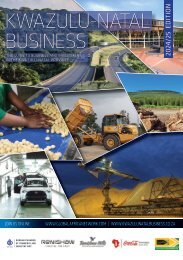South African Business 2018 edition
Welcome to the sixth edition of the South African Business journal. First published in 2011, the publication has established itself as the premier business and investment guide to South Africa, supported by an e-book edition at www.southafricanbusiness.co.za. Regular pages cover all the main economic sectors of the South African economy and give a snapshot of each of the country’s provincial economies. Feature articles on topical issues such as sustainability and African trade provide unique insights, together with an interview with the newly elected chairman of the African Association of Automotive Manufacturers, Mr Thomas Schaefer. Another special feature focusses on an exciting project to transform South Africa’s small harbours and coastal properties. South African Business is complemented by nine regional publications covering the business and investment environment in each of South Africa’s provinces. The e-book editions can be viewed online at www.globalafricanetwork.com. First published in 2011, the publication has established itself as the premier business and investment guide to South Africa, supported by an e-book edition at www.southafricanbusiness.co.za Regular pages cover all the main economic sectors of the South African economy and give a snapshot of each of the country’s provincial economies. Feature articles on topical issues such as sustainability and African trade provide unique insights, together with an interview with the newly elected chairman of the African Association of Automotive Manufacturers, Mr Thomas Schaefer. Another special feature focusses on an exciting project to transform South Africa’s small harbours and coastal properties. South African Business is complemented by nine regional publications covering the business and investment environment in each of South Africa’s provinces. Visit www.globalafricanetwork.com for more business and investment news, opportunities and events.
Welcome to the sixth edition of the South African Business journal. First published in 2011, the publication has established itself as the premier business and investment guide to South Africa, supported by an e-book edition at www.southafricanbusiness.co.za.
Regular pages cover all the main economic sectors of the South African economy and give a snapshot of each of the country’s provincial economies. Feature articles on topical issues such as sustainability and African trade provide unique insights, together with an interview with the newly elected chairman of the African Association of Automotive Manufacturers, Mr Thomas Schaefer. Another special feature focusses on an exciting project to transform South Africa’s small harbours and coastal properties.
South African Business is complemented by nine regional publications covering the business and investment environment in each of South Africa’s provinces. The e-book editions can be viewed online at www.globalafricanetwork.com.
First published in 2011, the publication has established itself as the premier business and investment guide to South Africa, supported by an e-book edition at www.southafricanbusiness.co.za
Regular pages cover all the main economic sectors of the South African economy and give a snapshot of each of the country’s provincial economies. Feature articles on topical issues such as sustainability and African trade provide unique insights, together with an interview with the newly elected chairman of the African Association of Automotive Manufacturers, Mr Thomas Schaefer. Another special feature focusses on an exciting project to transform South Africa’s small harbours and coastal properties.
South African Business is complemented by nine regional publications covering the business and investment environment in each of South Africa’s provinces. Visit www.globalafricanetwork.com for more business and investment news, opportunities and events.
Create successful ePaper yourself
Turn your PDF publications into a flip-book with our unique Google optimized e-Paper software.
INTERVIEW<br />
Meeting national<br />
development<br />
imperatives<br />
As the Head of Secretariat: Human Resource Development<br />
Council of <strong>South</strong> Africa, Brenda Ntombela is<br />
responsible for the overall leadership and<br />
management of the Secretariat.<br />
Brenda Ntombela<br />
BIOGRAPHY<br />
Brenda Ntombela is a graduate<br />
of the University of Limpopo,<br />
has a Master’s Degree in Nursing<br />
from the University of <strong>South</strong><br />
Africa and has completed various<br />
management courses. She<br />
has worked in Higher Education<br />
and ICT. She has served as a<br />
Councillor for the Independent<br />
Communications Authority of<br />
<strong>South</strong> Africa (ICASA), is currently<br />
a Council member at the Durban<br />
University of Technology and on<br />
the transformation Committee<br />
of the <strong>South</strong> <strong>African</strong> Council<br />
for Project and Construction<br />
Management Professions.<br />
What are the key goals of the Revised HRD Strategy<br />
Towards 2030?<br />
The HRD Strategy aims to:<br />
• Strengthen basic education and foundation programmes in<br />
Science, Technology, Engineering, Maths, Languages and Life<br />
Orientation/Skills<br />
• Expand access to quality post-schooling education and training<br />
• Improve research and technological innovation outcomes<br />
• Produce appropriately skilled people for the economy<br />
• Promote a developmental/capable state<br />
How does the plan differ from its predecessor?<br />
Various new government priorities and plans have been developed<br />
including the National Development Plan (NDP). Global trends and<br />
developments have also been taken into account, particularly the<br />
impact of the Fourth Industrial Revolution on government, business,<br />
individuals and society. These changes required a review of the<br />
Human Resource Development Strategy of <strong>South</strong> Africa (HRDSA)<br />
2010 to 2030. This Revised HRD Strategy outlines the human resource<br />
development imperatives that are needed to meet national<br />
development imperatives.<br />
What are the roles of various social partners in the<br />
strategy?<br />
Labour: Focuses on worker education including the training of shop<br />
stewards and negotiators to improve their understanding of labour<br />
law. Supports the analysis of requirements, including the implementation<br />
of skills audit and identifies programmes, general education<br />
as well as technical skills and supports training for the unemployed.<br />
<strong>Business</strong>: Continue to work on commitments within the Skills Accord.<br />
Implement the Chief Executive Officer initiative to support a Youth<br />
Employment Scheme (YES) which aims to put one-million youth into<br />
SOUTH AFRICAN BUSINESS <strong>2018</strong> 42


















